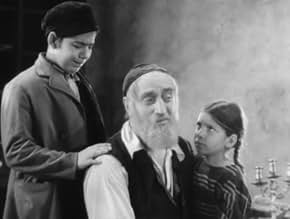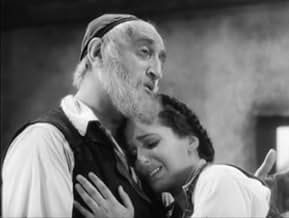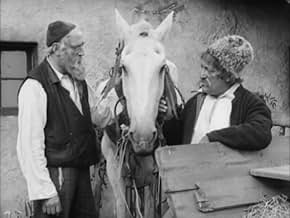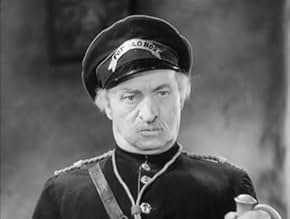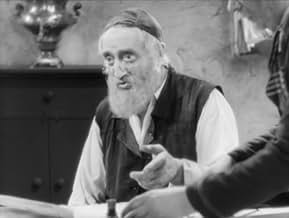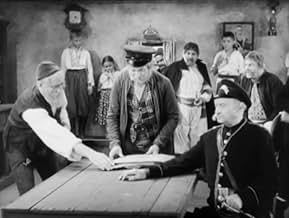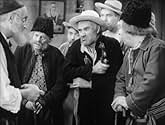Agrega una trama en tu idiomaThe original, non-musical film version of the book which inspired "Fiddler on the Roof".The original, non-musical film version of the book which inspired "Fiddler on the Roof".The original, non-musical film version of the book which inspired "Fiddler on the Roof".
- Dirección
- Guionistas
- Elenco
- Premios
- 1 premio ganado en total
- Dirección
- Guionistas
- Todo el elenco y el equipo
- Producción, taquilla y más en IMDbPro
Opiniones destacadas
Superbly acted and presented drama that beautifully illuminates its source material. Shot on a potato farm on Long Island for $70,000, producer/director/star Maurice Schwartz's lovingly handcrafted production puts contemporary Hollywood product (not to mention 1971's bloated "Fiddler on the Roof") to shame. Definitely not for Yiddish-language aficionados only; this is historical entertainment at its best.
Much more insightful than fiddler.
If you want to learn more about yiddish / ashkenazic culture, this film is a far better choice than fiddler.
This film also provides a much stronger and fuller character of Tevye.
If you want to learn more about yiddish / ashkenazic culture, this film is a far better choice than fiddler.
This film also provides a much stronger and fuller character of Tevye.
"Tevye and His Daughters"is a rather disjointed novel that was printed over a 20 year period.Each chapter stands independently of the others,and reflects the then-current situation of the Jews living in rural Tsarist Russia.We see the breakdown of a patriarchal mode of life,changing in response to the demands of an evolving society which is emerging from feudalism,having effects on all social strata.
"Fiddler on the Roof",one of the American musical theater's most enduring masterpieces,is based on 4 chapters of the original novel.In addition,it has been somewhat homogenized for popular consumption for the local public."Tevye",on the other hand,is based on roughly 2.5 chapters,which are found later in the saga.In addition,some of the personal degradation and humiliation Tevye encounters in the source,are seen in this version.
Maurice Schwartz is the star of the film.(It also helps,I guess,when he directed it as well.Able to give himself the best role.)His portrayal is NOT the gruff,jovial peasant seen in the musical.His rendition of the title part is much more cerebral,chipper,and acerbic than we might expect from this character.Nonetheless,it is entirely valid in its way.Enjoy this picture as an alternative interpretation.
"Fiddler on the Roof",one of the American musical theater's most enduring masterpieces,is based on 4 chapters of the original novel.In addition,it has been somewhat homogenized for popular consumption for the local public."Tevye",on the other hand,is based on roughly 2.5 chapters,which are found later in the saga.In addition,some of the personal degradation and humiliation Tevye encounters in the source,are seen in this version.
Maurice Schwartz is the star of the film.(It also helps,I guess,when he directed it as well.Able to give himself the best role.)His portrayal is NOT the gruff,jovial peasant seen in the musical.His rendition of the title part is much more cerebral,chipper,and acerbic than we might expect from this character.Nonetheless,it is entirely valid in its way.Enjoy this picture as an alternative interpretation.
10malvernp
Many people believe that 1939 was the greatest year in the history of American cinema. The major film studios were then operating at full throttle. Their creative and technical personnel were also performing at an extraordinarily high level, and there seemed to be no limit to what we thought the movies could then accomplish. This view also applied to the few important non-mainstream movies that were produced that same momentous year. By any objective standard, Maurice Schwartz's film Tevya (also known as Tevya the Milkman) must appear at or near the head of such a list.
And who was Maurice Schwartz? He was the Yiddish-American equivalent of Laurence Olivier and Charles Chaplin---a unique artist who produced, directed, wrote and acted in film. In addition, he founded the Yiddish Art Theatre in New York City, occasionally appeared on the Broadway stage, and even performed character roles in some mainstream Hollywood films toward the end of his career. He died in Israel at the age of 70 while exploring the creation of a Yiddish theater there. And in the opinion of many of us who have viewed this seldom seen classic, Schwartz was the greatest Tevya of them all. Zero Mostel (born in Brooklyn, N. Y. C.) was larger than life, and often seemed over the top as Broadway's original Tevya in Fiddler on the Roof. Topol----(an Israeli) while respectable in the popular movie version of the musical---seemed to lack that intangible element of charisma that was essential to capturing the full spirit of Sholem Aleichem's famous character. Finally, it should be noted that when Fiddler finally went on the road after its initial Broadway run, we were presented with some very fine Tevyas--like Herschel Bernardi and Paul Lipson. However, none of these actors truly captured the simplicity, power, decency and humanity that identified Schwartz's Tevya.
Why does Schwartz stand out as Tevya? There are several important reasons that may explain this result. First, he was born in Czarist Russia in 1890. While he came to America as a young boy, Schwartz actually experienced first hand the stress, pain and humiliation that Jews had to routinely deal with in order to survive in that difficult world. Second, Schwartz was not distracted by the songs, dances and other similar "business" that distinguished his straight dramatic film from Fiddler---the musical. Finally, performing it in Yiddish with an ensemble of similarly trained Yiddish actors also contributed to the authenticity of Schwartz's version.
Modern audiences may consider the acting style of Schwartz' and his players to be somewhat florid and possibly exaggerated--but it was not inaccurate. Some may take issue with how the various Christian characters are presented. But the reality was that Jews existed only as second class "citizens" in Czarist Russia, and daily life there was a constant reminder of who was oppressed, who were the oppressors and why such oppression was taking place.
Fiddler on the Roof has become a major musical drama with such overwhelming universal appeal that it enjoys almost unlimited popularity all over the world. Schwartz's Tevya--with its clarity, warmth and passion---makes that appeal completely understandable. Seek it out and be rewarded with a truly satisfying emotional experience.
And who was Maurice Schwartz? He was the Yiddish-American equivalent of Laurence Olivier and Charles Chaplin---a unique artist who produced, directed, wrote and acted in film. In addition, he founded the Yiddish Art Theatre in New York City, occasionally appeared on the Broadway stage, and even performed character roles in some mainstream Hollywood films toward the end of his career. He died in Israel at the age of 70 while exploring the creation of a Yiddish theater there. And in the opinion of many of us who have viewed this seldom seen classic, Schwartz was the greatest Tevya of them all. Zero Mostel (born in Brooklyn, N. Y. C.) was larger than life, and often seemed over the top as Broadway's original Tevya in Fiddler on the Roof. Topol----(an Israeli) while respectable in the popular movie version of the musical---seemed to lack that intangible element of charisma that was essential to capturing the full spirit of Sholem Aleichem's famous character. Finally, it should be noted that when Fiddler finally went on the road after its initial Broadway run, we were presented with some very fine Tevyas--like Herschel Bernardi and Paul Lipson. However, none of these actors truly captured the simplicity, power, decency and humanity that identified Schwartz's Tevya.
Why does Schwartz stand out as Tevya? There are several important reasons that may explain this result. First, he was born in Czarist Russia in 1890. While he came to America as a young boy, Schwartz actually experienced first hand the stress, pain and humiliation that Jews had to routinely deal with in order to survive in that difficult world. Second, Schwartz was not distracted by the songs, dances and other similar "business" that distinguished his straight dramatic film from Fiddler---the musical. Finally, performing it in Yiddish with an ensemble of similarly trained Yiddish actors also contributed to the authenticity of Schwartz's version.
Modern audiences may consider the acting style of Schwartz' and his players to be somewhat florid and possibly exaggerated--but it was not inaccurate. Some may take issue with how the various Christian characters are presented. But the reality was that Jews existed only as second class "citizens" in Czarist Russia, and daily life there was a constant reminder of who was oppressed, who were the oppressors and why such oppression was taking place.
Fiddler on the Roof has become a major musical drama with such overwhelming universal appeal that it enjoys almost unlimited popularity all over the world. Schwartz's Tevya--with its clarity, warmth and passion---makes that appeal completely understandable. Seek it out and be rewarded with a truly satisfying emotional experience.
I noticed this on TV after it started, so I missed the beginning. However, what I saw, which was most of it, moved me greatly.
I grew up in a home where Yiddish was used by my parents when they didn't want the kids to understand. Russian was used when they really didn't want us to understand! Unfortunately my Yiddish is not up to fully understanding the dialogue of the movie, though a meaningful percentage did come through. The titles were OK, and sometimes inadequate.
To compare this to Fiddler is impossible. This is a tragedy and Fiddler is a musical. The acting is very good. It is old-fashioned acting, with large emotions and gesture. The Yiddish, that which I could understand, is a very nice Yiddish. No Americanisms in it, as the Yiddish I heard at home.
One thing that was disturbing was the stereotypical portrayal of the non-Jewish characters. They were portrayed as coarse and mean-spirited. Of course, in a steytl in 19th century Russia, that was probably the norm.
I recommend this film to all. To those who grew up in an immigrant Jewish household, it is a must.
I grew up in a home where Yiddish was used by my parents when they didn't want the kids to understand. Russian was used when they really didn't want us to understand! Unfortunately my Yiddish is not up to fully understanding the dialogue of the movie, though a meaningful percentage did come through. The titles were OK, and sometimes inadequate.
To compare this to Fiddler is impossible. This is a tragedy and Fiddler is a musical. The acting is very good. It is old-fashioned acting, with large emotions and gesture. The Yiddish, that which I could understand, is a very nice Yiddish. No Americanisms in it, as the Yiddish I heard at home.
One thing that was disturbing was the stereotypical portrayal of the non-Jewish characters. They were portrayed as coarse and mean-spirited. Of course, in a steytl in 19th century Russia, that was probably the norm.
I recommend this film to all. To those who grew up in an immigrant Jewish household, it is a must.
¿Sabías que…?
- TriviaAlthough he isn't credited as an author of the script, the film is a faithful adaptation of the stage play "Tevye the Dairyman," written by Sholem Aleichem himself shortly before his death in 1916. He first offered the play to Jacob P. Adler, one of the great actors of the Yiddish theater, who declined, because there was no romantic leading role. Maurice Schwartz heard about the play, bought the rights from Sholem Aleichem's widow and staged it with himself in the lead role, to great success. Two decades later, he turned it into this film. The script is substantially as written by Sholem Aleichem, despite the introduction of characters and elements not contained in his original short stories.
- ErroresTowards the end of the film, Tevye says his daughter's plea, "My people are your people," is from the Book of Ecclesiastes. It's actually from the Book of Ruth.
- Citas
Chavah 'Khave': Why are there these differences between people, between beliefs?
Fedya 'Fedye' Galagen: Wicked people created these differences. But we should keep ourselves above all beliefs. Because you are my belief.
- ConexionesFeatured in Almonds and Raisins (1984)
Selecciones populares
Inicia sesión para calificar y agrega a la lista de videos para obtener recomendaciones personalizadas
Detalles
- Fecha de lanzamiento
- País de origen
- Idiomas
- También se conoce como
- Sholom Aleichem's Tevya
- Locaciones de filmación
- Productora
- Ver más créditos de la compañía en IMDbPro
Taquilla
- Presupuesto
- USD 70,000 (estimado)
- Tiempo de ejecución
- 1h 33min(93 min)
- Color
- Relación de aspecto
- 1.37 : 1
Contribuir a esta página
Sugiere una edición o agrega el contenido que falta

